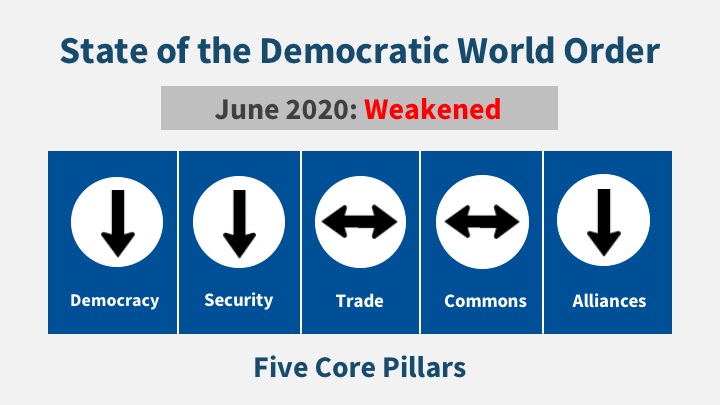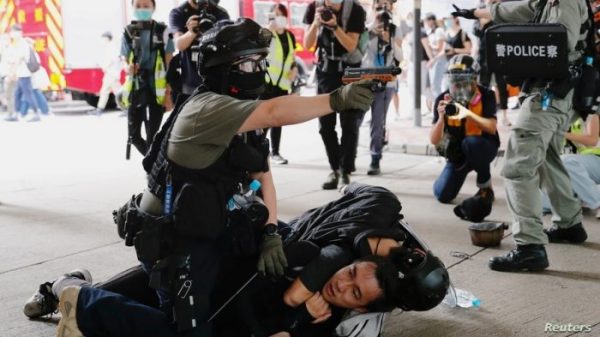Reshaping the order
This month’s topline events
Hong Kong under Siege. China imposed a repressive new national security law in Hong Kong that aims to curb political dissent and transfers local law enforcement authority to the mainland. Enacted on the eve of the 23rd anniversary of Britain’s transfer of the territory to China, the move violates Beijing’s commitment to preserve the fundamental freedoms and autonomy promised to Hong Kong residents under the “one country, two systems”principle.
- Shaping the order. China’s flagrant violations of international law have sparked a significant global backlash, undermining Beijing’s efforts to portray itself as a responsible global leader. The G-7 expressed “grave concerns” over Beijing’s actions and the US and other nations are considering sanctions and other retaliatory measures.
- Hitting home. Given the law’s far-reaching impacts, US technology firms are reevaluating their engagement in Hong Kong, and Beijing’s move could escalate pressure on US businesses to shift global supply chains away from China.
- What to do. The United States should work with allies to keep global attention focused on China’s actions and impose meaningful consequences, including potential sanctions. The Trump administration should also follow British Prime Minister Boris Johnson’s offer to provide refuge to Hong Kong residents at risk of persecution.
Putin for Life? Russians voted in a national plebiscite in late June that, according to the Kremlin, resulted in overwhelming approval of an amendment to the Russian constitution that bypasses current term limits and allows President Vladimir Putin to remain in power until 2036 – when he will turn eighty-four years old.
- Shaping the order. While polls and irregularities have cast doubt on the validity of the results, the plebiscite cements Putin’s hold on Russia and could encourage the Kremlin’s authoritarian policies abroad. Putin may feel emboldened to expand a sphere of influence in Eastern Europe and more forcefully challenge the interests of the United States and its allies in Syria, Afghanistan, and other parts of the world.
- Hitting home. Putin’s extended rule could solidify the Kremlin’s ongoing campaign to interfere in foreign elections and undermine democratic institutions, including in the United States.
- What to do. The United States should work assiduously with its allies to resist Putin’s provocations and seek ways to support democracy and human rights in Russia.
America’s Outbreak. The United States has experienced a dramatic surge in coronavirus infections, as states across the south and west contend with the consequences of early re-openings and public resistance to wearing masks. The soaring rates of infection stand in stark contrast to the situation in other advanced economies across Europe and East Asia, where the risks of the pandemic have fallen to new lows.
- Shaping the order. America’s inability to control the resurgence of the virus has cast doubts around the world about US competence at a time when public trust in the United States among its allies is dramatically deteriorating – fueling uncertainties about America’s global leadership role.
- Hitting home. The surge in cases is adding to the devastating human cost of the pandemic, while delaying America’s economic recovery and a return to normalcy.
- What to do. The United States needs to implement a coordinated national response to stop the spread of the virus, led by the experts at the Centers for Disease Control and Prevention, without mixed signals on testing and masks that have caused public confusion.
“We will continue to bring together our international partners to stand up for the people of Hong Kong, to call out the violation of their freedoms, and to hold China to their international obligations.”
____________________________________________ – Dominic Raab, British Foreign Secretary

State of the Order this month: Weakened
Assessing the five core pillars of the democratic world order
- Democracy (↓) – Reports of forced sterilizations and human hair harvesting exposed China’s appalling human rights practices in Xinjiang. Beijing’s crackdown in Hong Kong and Moscow’s enactment of illiberal amendments to the Russian constitution further undermined democratic norms.
- Security (↓) – Revelations that Russia has covertly offered bounties for killing U.S. and coalition troops in Afghanistan have alarmed US officials and suggest that Moscow may be prepared to engage in more brazen confrontations against the West. Clashes among Indian and Chinese troops along their disputed border led to the first fatalities between the two nations since 1975, while tensions temporarily flared after North Korea destroyed a joint liaison office along the South Korean border.
- Trade (↔) – While COVID-19 delayed ongoing Brexit talks, the United Kingdom and Japan began negotiating a new free trade agreement. Despite escalating tensions over Xinjiang and Hong Kong, the United States upheld Phase One of its trade deal with China. The IMF gave a sober outlook on the global economy, projecting global trade would fall around 12% in 2020.
- Commons (↔) – China’s attempts to fortify islands in the South China Sea faced pushback from ASEAN leaders who condemned these illegal acts, and from the United States, which deployed three aircraft carriers to the Pacific. Russia declared a state of emergency after 20,000 tons of diesel fuel from an Arctic power plant spilled into a river.
- Alliances (↓) – President Donald Trump’s move to unilaterally withdraw 9,500 US troops from Germany drew public criticism by German officials and led to renewed questions about America’s commitment to NATO. On a more positive note, the United States joined the Five Eyes intelligence allies to censure China’s actions in Hong Kong and keep Huawei out of its 5G networks.
Strengthened (↑)________Unchanged (↔)________Weakened (↓)
What is the democratic world order? Also known as the liberal order, the rules-based order, or simply the free world, the democratic world order encompasses the rules, norms, alliances, and institutions created and supported by leading democracies over the past seven decades to foster security, democracy, prosperity, and a healthy planet.
This month’s top reads
Three must read commentaries on the democratic order
- John Ikenberry argues in Foreign Affairs that the next US president should reinvigorate the values, norms, and institutions of the liberal world order by galvanizing the world’s democracies and issuing a new Atlantic Charter.
- Erik Brattberg and Ben Judah write in Foreign Policy that expanding the G-7 to a D-10 would enable leading democracies to better coordinate on key challenges facing the international order.
- Gideon Rachman contends in the Financial Times that tensions between India and China could accelerate a strategic alignment between India and Western democracies.
Action and analysis by the Atlantic Council
Our experts weigh in on this month’s events
- In a new Atlantic Council Strategy Paper on shaping the post-COVID world, Barry Pavel, Matt Kroenig, Jeff Cimmino, Rebecca Katz, and Josh Lipsky set forth a comprehensive approach for how America and its allies can recover from the current crisis and rejuvenate an adapted rules-based system.
- Paul Miller writes in The Dispatch that leading democracies should pursue a “narrower and deeper version of liberal order” in order to shore up its integrity, legitimacy, and resilience.
- Josh Lipsky and Dan Fried express concern in the New Atlanticist that the Voice of America and other US government broadcasters, which have long advanced the cause of freedom, are being politicized.
- The Free World Commission, a group comprised of influential legislators from Congress and leading democracies — organized by the Atlantic Council — issued a joint statement condemning the new security law in Hong Kong and calling for governments to recalibrate relations with Beijing.
- At the eighth meeting of the D-10 Strategy Forum, organized virtually by the Atlantic Council, Lowy Institute, and Australian Department of Foreign Affairs and Trade, officials and experts from North America, Europe, and Asia discussed key challenges to the rules-based order.
- The D-10, as a construct for bringing together leading democracies, continues to draw substantial interest (see the Times, Foreign Policy, Politico, the National Interest, and the Japan Times).
__________________________________________________
The Democratic Order Initiative is an Atlantic Council initiative aimed at reenergizing American global leadership and strengthening cooperation among the world’s democracies in support of a rules-based democratic order. Sign on to the Council’s Declaration of Principles for Freedom, Prosperity, and Peace by clicking here.
If you would like to be added to our email list for future publications and events, or to learn more about the Democratic Order Initiative, please email jbodnar@atlanticcouncil.org.
